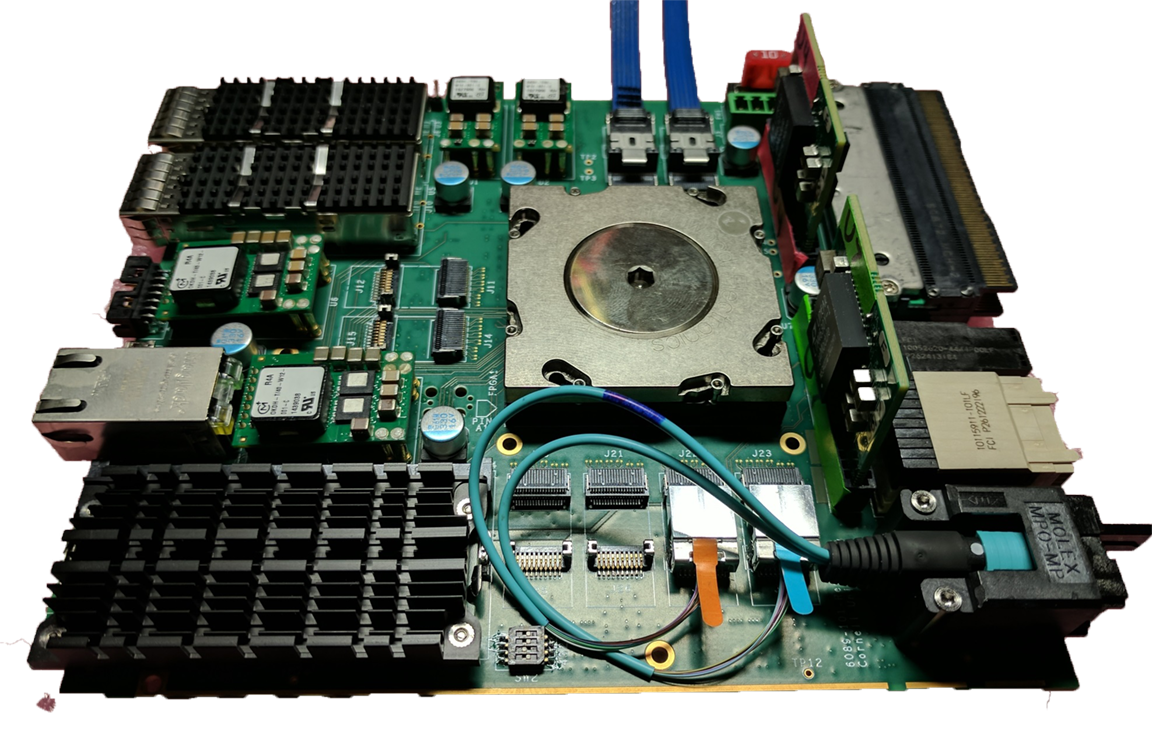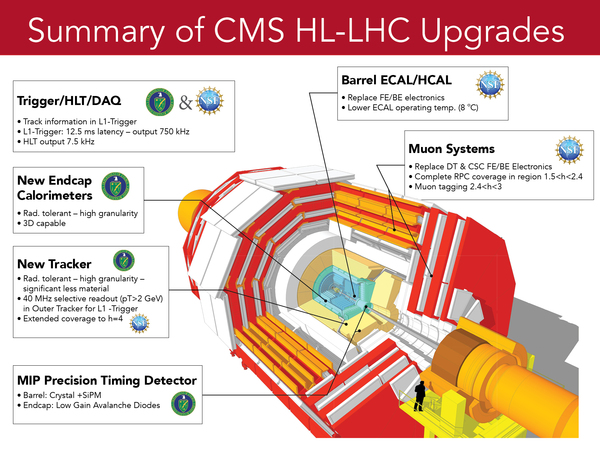CLASSE NEWS | 31 Jan 2018
 Track Trigger board developed here at CLASSE. Photo: Charlie Strohman
Track Trigger board developed here at CLASSE. Photo: Charlie Strohman
The $75M in funding that Cornell and collaborators are seeking from the NSF is a Major Research Equipment and Facility Construction (MREFC) grant, which will fund the construction phase of the project. (In addition to CMS, the ATLAS experiment is pursuing the same level of funding for a total investment from NSF of $150M for the upgrades of the HL-LHC detectors). This amount of funding, paired with the distribution of collaborators, mandates a tightly organized and recorded process that must be neatly delivered to the NSF. The approval process for an MREFC project is a multi-year process with three major stage-gate reviews:
Major Step Towards Approval of CMS HL-LHC Upgrades
Upgrading a large scale project like the CMS detector for the High Luminosity-LHC is no small task. The hope and promise of discovery are dually met with the daily chores of meetings and reports. Years of research, planning, and presentations are needed, not only for the design of the actual upgrades, but for funding agencies to approve additional money for the next stage of the project. While arduous, these major milestone reviews are extremely helpful in providing feedback and are important steps to ensure the project is on track. In the U.S., the upgrades of the CMS detector are a joint project between the National Science Foundation (NSF) and Department of Energy (DOE). The NSF scope of the upgrades are coordinated at Cornell, where the DOE project is lead by Fermilab (V. O'Dell). Cornell University plays a major part in the design and construction of the forward pixel upgrades and the track trigger project. This NSF-funded portion also includes electronic upgrades to the barrel calorimeter and the forward muon detectors. In total, about 25 U.S. universities are involved in this upgrade, which adds another level of complexity in the coordination of the overall project. Track Trigger board developed here at CLASSE. Photo: Charlie Strohman
Track Trigger board developed here at CLASSE. Photo: Charlie Strohman The $75M in funding that Cornell and collaborators are seeking from the NSF is a Major Research Equipment and Facility Construction (MREFC) grant, which will fund the construction phase of the project. (In addition to CMS, the ATLAS experiment is pursuing the same level of funding for a total investment from NSF of $150M for the upgrades of the HL-LHC detectors). This amount of funding, paired with the distribution of collaborators, mandates a tightly organized and recorded process that must be neatly delivered to the NSF. The approval process for an MREFC project is a multi-year process with three major stage-gate reviews:
- Conceptual Design Review - This review was held in March 2016 and focussed on the project science case and cost envelope
- Preliminary Design Review - The review held in Dec. 2017 which focused on the project definition, cost, and schedule and defines a baseline for the project.
- Final Design Review - Scheduled for Fall 2019 and will focus on the project execution readiness such as project control tools and earned value.
- A. Ryd - U.S. CMS HL-LHC Deputy PM and NSF PI
- S. Rogers - P6 scheduler
- A. Malahowski - Project controls contractor through MRC
- L. Taylor - Associate PM for Cost/Risk/Schedule
- J. Dolph - Systems Engineering contractor
- C. Wilkinson - Project managment consultant
- B. Frankin, C. Kastenhuber - Financials
- T. Hawkins - Purchasing
- K. Jacoby, J. Slater, J. Curtiss, K. Malysheva - Administrative Support
- J. Alexander - L2 co-manager (and acting L3 mechanics)
- Y. Bordlemay Padilla - Mechanical Engineer
- C. Strohman - Electrical Engineer
- T. O'Connell - Engineering management
- J. Conway - Mechanical Engineer
- J. Thom - Pixel Sensors
- Y.Y. Cheng - Simulation
- P. Wittich - L3 manager
- C. Strohman - Electrical Engineer
- L. Skinnari - Software and performance studies
- M. Zientek, J. Chaves, Z. Tao - Software and firmware development

